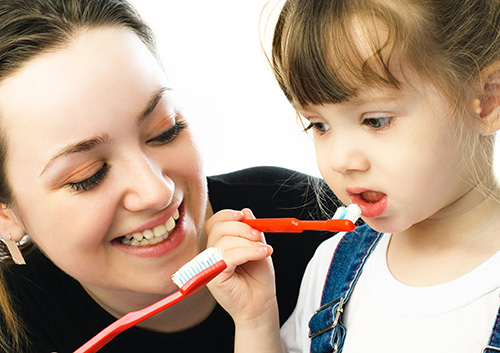August 23rd, 2019

When it comes to dental hygiene, “going green” is not the first phrase that comes to mind. But if you are brushing properly, you are also replacing your toothbrush every three to four months as the bristles become frayed and wear down. Sure, that’s a tiny amount of plastic from each of us going to our landfills, yet it adds up to millions of brushes a year nationally. If you are concerned about reducing your carbon footprint while reducing your risk of cavities, there are several new toothbrushes designed to make brushing more eco-friendly.
Biodegradable Toothbrushes
Some brushes claim to be completely compostable. These models generally have heads fitted with boar bristles and handles manufactured from sustainable woods or bamboo. Boar bristles aren’t for everyone. Some users complain of the taste of the bristles, and boar bristles might be harsher than the soft bristles we recommend to protect both enamel and gums. There is also some concern about bacteria growth on organic bristles.
Earth-friendly Handles and Bristles
If you prefer the consistency and texture of regular synthetic bristles, you can still opt for a brush with a handle of sustainable wood or bamboo. You can also select PBA-free bristles, bristles made primarily of castor oil, or bristles that use natural ingredients in combination with synthetics.
Reduce, Reuse, Recycle
If these exotic brushes aren’t for you, there are more conventional choices that will save energy and cut down on waste.
- Reduce the amount of electricity you use for your electric toothbrush with a model that requires less charging time.
- Reuse your toothbrush by buying one with a handle made of metal, natural materials or plastic and replace the detachable head every three months.
- Recycled plastics can be found in the handles of some toothbrushes, and many brushes come in recyclable packaging. Every bit helps!
If you decide to use one of these green products, remember that your dental health is still the primary goal. Be sure the bristles of your brush are soft enough to protect your gums and enamel and can reach all the places you need to brush. The handle should be easy to grip and the head should be a comfortable fit for your mouth. It’s always best to choose products with a seal of acceptance from your local dental association, or talk to us about greener alternatives during your next visit to our Appleton, WI office. Luckily, there are several workable options to protect the health of your family's teeth while still being mindful of the health of our planet.
August 16th, 2019

Many parents have concerns about their children’s teeth not falling out on time. Dr. Dale Scharine and Dr. Alissa Edwards and our team are here to answer any questions parents may have about when children lose their teeth.
Children have 20 primary teeth that come in around age three. By about age six, these teeth will loosen and begin to fall out on their own to make room for the permanent ones. It is common for girls to lose their baby teeth earlier than boys. Most children lose their final baby tooth by age 13.
Baby teeth normally fall out in the order in which they came in. The lower center incisors are usually the first to fall, around age six or seven, followed by the upper central incisors.
If a child loses a tooth to decay or an accident, the permanent tooth may come in too early and take a crooked position due to teeth crowding. If your child loses a tooth to decay or accident, call Dr. Dale Scharine and Dr. Alissa Edwards to make an appointment.
Some kids can’t wait for their baby teeth to fall out, while others dread the thought of losing a tooth. When your child begins to lose teeth, you should emphasize the importance of proper dental care on a daily basis to promote a healthy mouth.
Remember to:
- Remind your child to brush his or her teeth at least twice a day and offer assistance if needed
- Help your child floss at bedtime
- Limit eating and drinking between meals and at bedtime, especially sugary treats and drinks
- Schedule regular dental visits for your child every six months.
- Ask about the use of fluoride treatments and dental sealants to help prevent tooth decay.
Call Elite Smiles Dental to learn more about caring for baby teeth or to schedule an appointment at our Appleton, WI office!
August 9th, 2019

Dental veneers are a popular treatment to improve the appearance of your smile. Dr. Dale Scharine and Dr. Alissa Edwards and our team want to help you understand whether this dental option is right for you.
Veneers, also known as laminates, are custom-made shells that cover the front of your teeth. They can change the color, size, or length of each individual tooth. The process can require between one and three trips to our Appleton, WI office to complete.
This treatment is usually done for people who want to change the appearance of their smile: they can get rid of stains, gaps, or chips. Here at Elite Smiles Dental, we know how getting veneers can dramatically change your smile and help improve your confidence.
Your initial appointment entails preparing the teeth and creating an impression. The impression will help us design each veneer to the exact shape and color you desire. You’ll come back in a week or two to have the veneers placed. Your veneers should last about ten years, as long as you practice proper care and hygiene.
There are plenty of benefits to getting veneers, but you should be aware of the potential downsides of this procedure. This process is irreversible and the veneers cannot usually be fixed. If they chip or crack, they’ll need to be replaced.
It is also possible for veneers to fall off due to excessive pressure from nail biting or chewing on ice. If you grind your teeth a lot, you’re more likely to expose your veneers to damage, which can be costly to repair.
In order to know whether veneers are right for you, schedule an appointment at our Appleton, WI office for a consultation. We can decide what you’re looking to do with your smile and if this is the best option for you.
August 2nd, 2019

You’ve selected the Invisalign system because of the many benefits Invisalign offers: comfort, convenience, appearance, and even potentially shorter treatment time! And to add to the good news, caring for your Invisalign aligners is easy and uncomplicated. Follow these simple tips to keep your aligners in the best possible shape as you move through the stages of your treatment.
Stay Clean
- Always brush and floss your teeth before using your aligners so that bacteria and food particles will not have a chance to collect around your teeth while you wear them.
- When you brush your teeth, be sure to brush your aligners with a separate soft toothbrush and lukewarm water as well.
- Rinse your aligners whenever you remove them during the day.
- Soak your aligners as recommended. Use the Invisalign Cleaning System or ask our Appleton, WI team for other suggestions to keep your aligners free from odor and bacteria.
Stay Clear
One of the reasons you chose Invisalign is for an almost invisible appearance. Why take a chance on discoloration or scratches that will make the appliance more noticeable? Here are some common mistakes that can affect the color of your aligners:
- If your aligner has white spots, that might mean plaque build-up. Always rinse your aligner after you remove it and clean it thoroughly night and morning.
- Brushing with anything other than a soft brush and brushing too hard can cause scratches in the material which might be noticeable. A gentle touch will work to clean and protect your aligners.
- Eating with Invisalign aligners can cause staining. More important, it can cause the retention of food particles in the appliance, which can lead to dental problems. Finally, aligners are not meant for chewing—they might be damaged or lose their ideal shape even with soft foods. If you are going to be eating or drinking, take your aligners out, give them a rinse, and brush before you replace them. Or stick with water! Water will have no ill effects on teeth or aligners.
- Only soak aligners in an appropriate solution. Harsh chemicals, colored mouthwashes, and even some toothpastes can dim or discolor the clear plastic.
Talk to Dr. Dale Scharine and Dr. Alissa Edwards about the best products to use and the best methods for taking care of your aligners. After all, making the process of improving your smile as easy and effective as possible is yet another benefit of choosing Invisalign!





 Website Powered by Sesame 24-7™
Website Powered by Sesame 24-7™